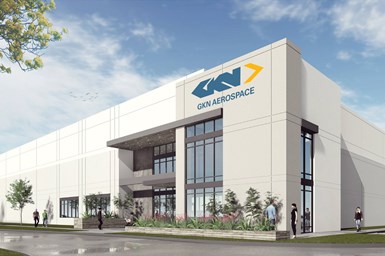GKN Aerospace Creating Additive Manufacturing Center of Excellence in Texas
When at full capacity, the center will house up to 100 personnel focused on collaborative research and development for next-generation airframe and aero-engine applications.
Share
Read Next
GKN Aerospace is relocating its North America additive manufacturing (AM) center of excellence to the Lone Star Commerce Center in Fort Worth, Texas. The move is designed to strengthen its position as an additive technology leader with a larger facility, plans for an additional larger AM cell and increased collaboration within the aerospace ecosystem.
The 100,000-square-foot facility will initially house research and development of laser metal deposition with wire (LMD-w) AM technology for large scale titanium aerostructures. GKN Aerospace is transferring existing equipment and personnel from Oak Ridge National Laboratory’s Manufacturing Demonstration Facility in Tennessee to the new site in Texas. Over the next few years, GKN Aerospace expects to transform the facility into its fourth Global Technology Center to complement existing centers in Sweden, the Netherlands and the UK.
“We are very excited to bring our additive technology research to Fort Worth. With proximity to many of our major customers in Texas and across the U.S., this is the right place for GKN Aerospace,” says Shawn Black, GKN Aerospace’s president of defense. “Along with partnership with local government, we look forward to expanding our titanium additive manufacturing capabilities and pushing the boundaries of this technology for our customers and the aerospace industry.”
GKN Aerospace will renovate the facility with office space and equipment over the next two years, while the City of Fort Worth will provide grant funding based on qualified R&D investment. When at full capacity, the center will support up to 100 personnel.
“Fort Worth is proud to welcome GKN Aerospace and excited by the cutting-edge R&D that it will bring to the region,” says Robert Sturns, director of economic development for the City of Fort Worth. “This center of excellence builds on a strong cluster of Fort Worth-based firms who are innovating the future of aerospace and transportation manufacturing, and we look forward to the partnership that we are building with GKN Aerospace.”
GKN Aerospace is a provider of LMD-w technology, with decades of experience in advanced aero-engine component development and large aerostructure expertise, with AM components currently flying on platforms across the civil, engines and space markets. It recently achieved a milestone by completing its largest titanium AM demonstration part to date, with the production of a component measuring 8 ft. (2.5 m) and processed from approximately 100 lbs of titanium wire.
- Learn more about ‘What Does Additive Manufacturing Readiness Look Like?’ The promise of distributed manufacturing is alluring, but to get there AM first needs to master scale production. GKN Additive’s Michigan facility illustrates what the journey might look like.
- Read about GKN Aerospace successfully testing lightweight turbine rear structure. The company says an innovative design and manufacturing of shorter, lighter turbine rear structure can contribute to lower carbon emissions.
Related Content
-
Aircraft Ducts 3D Printed in Composite Instead of Metal: The Cool Parts Show #68
Eaton’s new reinforced PEKK, tailored to aircraft applications, provides a cheaper and faster way to make ducts compared to formed aluminum.
-
3D Printed Lattice for Mars Sample Return Crash Landing: The Cool Parts Show Bonus
NASA Jet Propulsion Laboratory employs laser powder bed fusion additive manufacturing plus chemical etching to create strong, lightweight lattice structures optimized to protect rock samples from Mars during their violent arrival on earth.
-
Additive Manufacturing Is Subtractive, Too: How CNC Machining Integrates With AM (Includes Video)
For Keselowski Advanced Manufacturing, succeeding with laser powder bed fusion as a production process means developing a machine shop that is responsive to, and moves at the pacing of, metal 3D printing.















